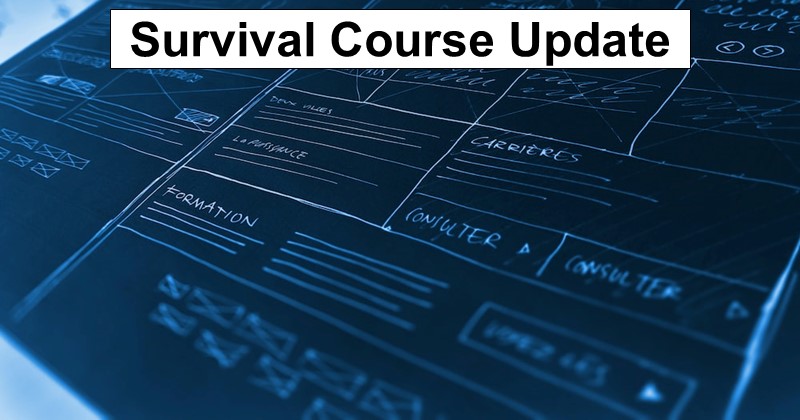There are many interesting aspects to life as I get older, and by “interesting” I mean they mostly suck. One aspect that I’ve found less than ideal is my lack of desire to get things done that I’ve committed to. Whereas I used to “go, go, go” until bedtime, that’s just not the case these days. Couple this with an unrealistic timeframe to start with, and I tend not to get things done as quickly as I assumed I would. This survival course update is no exception.
But I have been working on it, and I even have an excuse! Sort of…
You see, I thought I was nearly done earlier this week. I’d been diligently working on the course over the past month, adding a lot of information, including PDF files, checklists, and more. In fact, I intend on having nine whole video modules covering the questions people ask me most. I also revamped the email portion of the course, and I’ve even included several bonus files.
I was on a roll.
But then, when I went back to look at the videos I’d made, it turns out that most of the audio I’d recorded–four or five hours worth over the course of a few days–didn’t record. That might not sound like such a horrible thing, but it was rather upsetting at the time because I’d not only lost a bunch of work, but also because I’m not much of a speaker either, so it takes a lot for me to work up the desire to do it. Not that this is your problem, but after trying again this week I’ve since given up on getting this done before the holidays with family coming in town.
Ultimately, that’s probably a good thing because I’d hate to rush it. And you’ll be happier to have a better experience, too. I’ve also considered how I might present the videos in a different format as well, but I haven’t fully decided yet.
In any case, the course will include the following nine video modules:
- How to prepare on a budget (and save money on preparedness supplies)
- How to prepare with limited time (mostly about saving time after disaster)
- How to get spouse/family onboard (perhaps the most crucial problem!)
- How to organize preps and maximize space (you can do a lot with limited space, and if you organize from the start, then you’ll be in great shape)
- How to bug out (what to do before disaster, how to plan evacuation, considerations for bug out in a vehicle and on-foot, and more)
- How to shelter in place (this becomes a difficult topic when hours turn into days or weeks; we’ll discuss supplies, locations, pets, security, and more)
- How to have privacy in the suburbs (it’s more than light, noise, odor, and litter discipline; and it starts before disaster even strikes)
- How to prepare for a long term power outage (problems abound when the power stays out for days or weeks on end!)
- How to prepare when away from home (disasters don’t wait for you to be at home and ready for them; we talk about EDC, vehicles, work, and more)
There are several bonuses included, too:
- The best barter items (I given my thoughts on 41 of the best barter items)
- A list of important documents (mostly for bug out, but any disaster can necessitate having these files handy)
- Expiration dates of food and supplies (100+ items are considered; I was surprised at what I’d found)
- Long-term task tracking worksheet (it’s easy to let preparedness actions go as times goes on; here’s how to stop that from happening)
- The best free survival guides to download (there are hundreds of free guides out there, but only a fraction are useful)
- A priority checklist (ensure you get all the supplies and other crucial items you don’t want to leave behind)
- One pager worksheet (for personal disasters)
- Fire safety plan (fires are one of the most common disasters; here’s how to ensure your family stays safe and you can recover as quickly as possible)
I may include a few additional bonus files, such as a food storage calculator and home hazard hunt worksheet, but I haven’t decided yet.
Is there something not included above that you would like to see? Leave a comment or send me an email and I’ll consider it.
As for timing, I’d hate to pin myself down again, but if this isn’t done by sometime in January of 2024, then I’ll have to figure out who I can blame besides myself. I’m thinking it’ll be a “dog at my homework” sort of situation. 😉

Leave a Reply